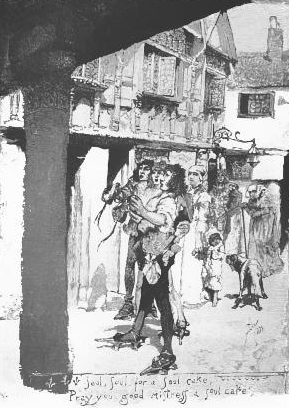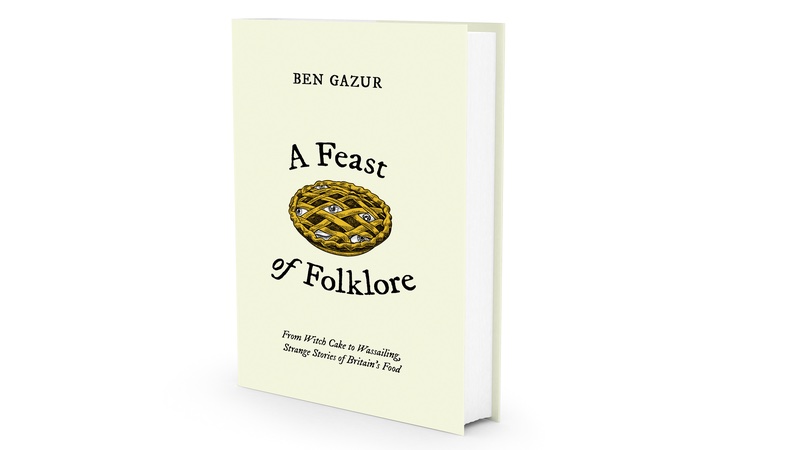You are sitting comfortably in your home when there is suddenly a knock on the door. Outside stands a choir of young boys who strike up the following song:
God bless the master of this house,
The mistress also,
And all the little children
That round your table grow.
Likewise young men and maidens,
Your cattle and your store;
And all that dwells within your gates,
We wish you ten times more.
[Chorus]
A soul! a soul! a soul-cake!
Please good Missis, a soul-cake!
An apple, a pear, a plum, or a cherry,
Any good thing to make us all merry.
One for Peter, two for Paul
Three for Him who made us all.
Down into the cellar,
And see what you can find,
If the barrels are not empty,
We hope you will prove kind.
We hope you will prove kind,
With your apples and strong beer,
And we’ll come no more a-souling
Till this time next year.
[Chorus]
The lanes are very dirty,
My shoes are very thin,
I’ve got a little pocket
To put a penny in.
If you haven’t got a penny,
A ha’penny will do;
If you haven’t get a ha’penny,
It’s God bless you
[Chorus]
What exactly do you do? If you have prepared for Allhallowstide, the days of Halloween, All Saint’s Day, and All Soul’s Day, then you will have a pile of Soul Cakes ready to reward the singers.
Soul Cakes are biscuits studded with dried fruit and marked with a cross on the top. The recipe is an ancient one, though it is hard to say exactly how old. John Aubrey, an antiquarian working in the 17th century, recorded how homes would have a high heap of “soule-cakes” on their sideboard. Each person who entered would be given a soul cake. When they were taken a rhyme would be said:
“A Soule-cake, a Soule-cake,
Have mercy on all Christen soules for a Soule-cake.”

The idea of soul cakes was that for the gift of these biscuits guests would offer up prayers for the souls of the deceased. In the Christian church of the Medieval era, it was possible for the prayers of the living to shorten the time souls would spend in Purgatory before making their way to Heaven. The wealthy could afford to build chantries – special religious establishments where masses were sung for the departed. Less affluent people had to find mercy for their dead in simpler ways. A cake for a soul seems a rather good deal.
Even after the Reformation when the idea of Purgatory was largely abandoned in England Soulers could still be found traipsing from door to door in search of a little cake. Some have seen in these bands of singers the origins of modern day trick or treaters.
Few today still keep their home well-stocked with soul cakes as Winter approaches. Should you want to make your own then there are a huge variety of recipes to attempt. A simple shortbread mix can be used for the biscuits, with spices like cinnamon to make them more festive. There was no single traditional shape or form that soul cakes take but most are small enough to fit in the palm and round. If you want a more lavishly decorated soul cake you can use raisins to make the cross on top.
While hardly any houses still hand out soul cakes their spirit lives on in a renewed interest in the music that accompanied their distribution. Sting has performed the song as written above but other versions of the song have been performed by many other singers. So if you’re feeling peckish, or want to do a good deed for a suffering soul, then you might want to learn these songs before heading next door for a soul cake.
Ben Gazur is an author and writer with a strong interest in folklore. He has a book about British food folklore, A Feast of Folklore, that is currently crowdfunding on Unbound.com. If you support it you will help to spread some great old tales, and get your name printed in the book! – https://unbound.com/books/folklore/


About A Feast of Folklore
British food has a somewhat dubious reputation. Who in their right mind would eat a Puppy Pie? Is a toad-in-the-hole something edible? I can even imagine some people turning their nose up at my Nan’s Toenail Pudding. The quirky nature of British food is matched by hundreds of years of folklore and folk tales that A Feast of Folklore brings to life.
A Feast of Folklore leads you down the dark alleys of British food history to meet the gloriously eccentric folk and the food they used in everything from magic spells to medicine. They even ate some of it.
Why do people hurl themselves down a hill in pursuit of a wheel of cheese? Why are hot cross buns hung from the rafters of a pub? Why do farmers shoot their shotguns through the branches of apple trees? The questions may be peculiar, but the answers are all peculiarly British.
In twelve chapters packed with more titbits of folklore than a Stargazy Pie has fish-heads A Feast of Folklore brings dark magic and deadly delicacies back into the home, where they belong. Alongside folk tales you’ll find recipes and instructions for those brave enough to give these traditions a go. Here’s a smörgåsbord of what you’ll find inside:
- Bread – How to get perfect bread every time by placing a Pixie Loaf next to your oven.
- Hot cross buns – Why, grated into a drink, they cure all ills.
- Cakes – Are witches really put off by urine in a cake?
- Baking – Why the village of Biddenden makes biscuits in the shape of conjoined twins.
- Eggs – How you can stop a witch using an egg-shell as a boat.
- Dairy – Why a pregnant lady might use a groaning cheese.
- Meat – How not arguing with your spouse could win you a side of bacon.
- Fruit – What day the devil urinates on Britain’s blackberries.
- Vegetables – How to ward off the flu with an onion.
- Drink – Will a live eel placed in a drink really cure alcoholism?
- Spices – How much salt should you place on a corpse’s chest?
- Love spells – How to find your true love with nothing more than an onion under your pillow.
Inspired by Ben’s gourmand appetite for both food and folklore, A Feast of Folklore will have you looking at your Spotted Dick in an entirely new light.
Help to crowdfund A Feast of Folklore an d receive rewards via: https://unbound.com/books/folklore/
